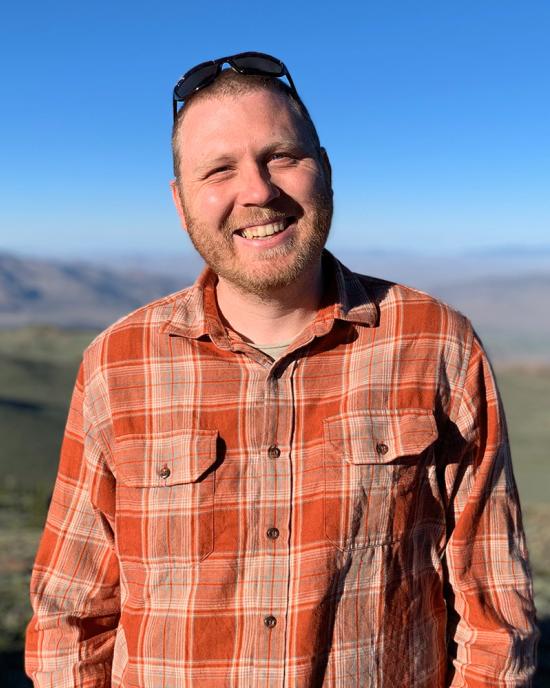
Paul Burow
PhD Candidate in Environmental Anthropology
- PhD Student

PhD Candidate in Environmental Anthropology
The Ecology of Belonging: Cultural Dynamics of Environmental Change in the North American West
My recently completed dissertation examines the social and cultural dimensions of environmental change in the rural North American West. Based on thirty-six months of field-based ethnographic and historical research in the Great Basin and Sierra Nevada regions of California and Nevada, it investigates the cultural politics of land and its stewardship in dryland forest and shrub steppe ecosystems as it intersects with a changing climate, land-use histories, and environmental governance regimes. Landscapes are undergoing material transformation due to climate change, land-use practices, and settler colonialism, in turn reshaping how people relate to land, substantiate their place on it, and make claims to territory. This is creating new socioecological configurations of people, land, and place I call ecologies of belonging.
The cultural and political dynamics that shape the construction and maintenance of the boundaries of belonging and non-belonging in these assemblages are explored through a series of interconnected chapters that show how Paiute people, federal land managers, and livestock ranchers navigate environmental changes and understand their changing relationship to the land through the work of constructing place and belonging for themselves and others. I elucidate these processes through four ethnographic case studies explaining major sociocultural dynamics of rapidly shifting landscapes: (1) moral ecologies reflected in conflicting modes of landscape valuation and moral claims-making that play out in stewardship encounters over the proper maintenance of relationships between people, plants, and animals; (2) sage grouse conservation as a project of cultivated belonging that seeks to reshape how species are perceived in relation to the land through their iconicity as an indicator of healthy ecosystems; (3) aesthetic representations of desert landscapes I call the settler pastoral that sustain an agrarian vision for productive rural lands tied to the production of food and reproduction of culture through livestock ranching that is challenged for its erasures by Great Basin Indigenous artists and land rights advocates through the visualization of extraction; and (4) heritage politics evident in contested regimes for managing cultural heritage on public lands that structure relationships between Native Nations and federal land mangers over material culture and Indigenous claims to land and belonging. A series of intercalary chapters provide natural history profiles for four important nonhuman figures in this study: pinyon pine, sage hen, cheatgrass, and cattle. These sections collectively describe the life history and place of these plants and animals on the land and the role they play as actors shaping landscapes.
By unraveling the uneven effects of environment change for Indigenous nations, natural resource managers, livestock ranchers, and rural communities—all of whom are affected by large-scale wildfires, the threat of species extirpation, evolving land use practices, and novel ecosystems—this dissertation breaks new ground to show the contingent and quotidian practices of land stewardship that reshape the landscape of place and belonging in the Great Basin. The dissertation shows how the social identities and cultural practices of Paiute people are destabilized by the loss of traditional foods and access to forestlands for cultural practices due to large-scale wildfires; drought-induced plant mortality; ecological restoration projects; and land-use impacts from livestock grazing, outdoor recreation, and mining development. It describes how livestock ranchers are gradually being displaced on the land as their operations are upended by changing societal values and governance regimes affecting land use that are making cattle increasingly out of place on Great Basin uplands even as protections for valley agricultural lands are being expanded to sustain ranching and maintain undeveloped open space. Land managers struggle with the multiplying burdens of environmental change, contending with limited staffing and highly bureaucratic processes that make adaptation to changing circumstances difficult in light of existing paradigms of environmental values and knowledge about what constitutes natural variation in ecosystems in unprecedented times.
This project offers insight into how land stewardship and public lands policy affect Indigenous nations and rural communities facing rapid socioecological change in the rural US West. It links material changes in the landscape to historical land management practices and shifting experiences of place that are affecting the land-based practices and cultural attachments that natural resource-dependent communities maintain with rural lands. The institutional barriers to Indigenous stewardship on public lands limit important cultural practices that sustain the lifeways and livelihoods of Indigenous peoples, but new models are demonstrating promise in increasing collaboration and community-led stewardship. This work highlights the contestation of settler colonial land regimes by Paiute people and the vision of local communities for livable, hospitable landscapes that support multiple forms of life and belonging in the Anthropocene.
For more information on my overall research program, see: https://www.paulburow.org/research
I recently completed the combined doctoral degree program between the School of the Environment and Department of Anthropology at Yale University. I am an interdisciplinary social-environmental scientist studying how human communities are impacted by environmental change. My work addresses the cultural dynamics of environmental change, Indigenous environmental justice, and rural social inequality in North America. My areas of research and teaching interest include environmental anthropology, Indigenous environmental studies, ethnoecology, and human-environment geography. I am also engaged in community-based participatory research projects with Tribal Nations to expand Indigenous-led land stewardship and protect cultural landscapes from degradation for the benefit of future generations.
I acknowledge that my home and place of work are situated on the traditional homelands of the Numu (Northern Paiute), Wašiw (Washoe), Newe (Western Shoshone), and Nuwu (Southern Paiute) peoples. These lands continue to be a gathering place for Indigenous peoples and I recognize their deep connections to these places. I extend my appreciation for the opportunity to live and learn on their territories and commit myself to advancing Indigenous sovereignty, community well-being, and healthy ecosystems in my work.